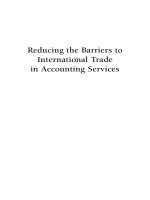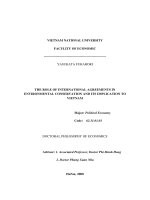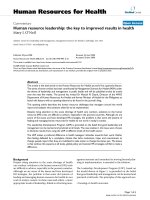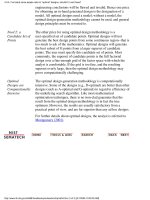Reducing the barriers to international trade in accounting services
Bạn đang xem bản rút gọn của tài liệu. Xem và tải ngay bản đầy đủ của tài liệu tại đây (296.1 KB, 72 trang )
Reducing the Barriers to
International Trade
in Accounting Services
AEI STUDIES ON SERVICES TRADE NEGOTIATIONS
Claude E. Barfield, series editor
REDUCING THE BARRIERS TO INTERNATIONAL
TRADE IN ACCOUNTING SERVICES
Lawrence J. White
INSURANCE IN THE GENERAL AGREEMENT ON TRADE IN SERVICES
Harold D. Skipper, Jr.
Reducing the Barriers to
International Trade
in Accounting Services
Lawrence J. White
The AEI Press
Publisher for the American Enterprise Institute
WASHINGTON, D.C.
2001
Available in the United States from the AEI Press, c/o Publisher
Resources Inc., 1224 Heil Quaker Blvd., P.O. Box 7001, La Vergne, TN
37086-7001. To order, call 1-800-937-5557. Distributed outside the
United States by arrangement with Eurospan, 3 Henrietta Street,
London WC2E 8LU, England.
ISBN 8447-7157-0
1 3 5 7 9 10 8 6 4 2
© 2001 by the American Enterprise Institute for Public Policy Research,
Washington, D.C. All rights reserved. No part of this publication may be
used or reproduced in any manner whatsoever without permission in
writing from AEI except in the case of brief quotations embodied in
news articles, critical articles, or reviews.
The AEI Press
Publisher for the American Enterprise Institute
1150 17th Street, N.W.
Washington, D.C. 20036
Printed in the United States of America
Contents
FOREWORD, Claude E. Barfield
v
ACKNOWLEDGMENTS
xi
1
INTRODUCTION
1
2
BACKGROUND
3
3
WHY INTERNATIONAL TRADE IN SERVICES IS
(AND IS NOT) DIFFERENT FROM TRADE IN GOODS
5
4
ACCOUNTING SERVICES IN INTERNATIONAL TRADE
11
5
THE IMPEDIMENTS TO TRADE IN ACCOUNTING SERVICES 18
6
DIFFERING ACCOUNTING STANDARDS: HOW
IMPORTANT IS HARMONIZATION?
22
7
THE CURRENT FRAMEWORK FOR NEGOTIATIONS
28
8
THE ROAD AHEAD
34
9
CONCLUSION
37
NOTES
39
REFERENCES
43
GLOSSARY OF TRADE TERMS
47
ABOUT THE AUTHOR
55
v
Foreword
T
he service sector accounts for more than 70 percent
of the gross domestic product (GDP) of advanced
industrial economies. Though trade in services is difficult to calculate and many transactions still go uncounted,
current estimates place the worth of such trade as at least
$2.5 trillion, or about a third of total world trade.
For the United States, the world’s most advanced industrial economy, the service sector looms even larger. Services
account for almost 80 percent of U.S. production and U.S.
employment (while manufacturing accounts for 19 percent
of U.S. GDP and 18 percent of U.S. employment). The surplus in U.S. services trade also partially offsets persistent
U.S. merchandise trade deficits. In 1999, the services trade
surplus was $76 billion; the merchandise deficit, $347 billion.
Despite the increasing importance of services trade and
investment, only in 1995 did the multilateral trading system
establish rules for opening markets in these economic sectors by negotiating the General Agreement on Trade in
Services (GATS). This first effort at a discipline for services
trade and investment created a framework of general principles and rules but left the large-scale liberalization of individual sectors to later negotiations.
Subsequently, under a mandate established as a part of
the Uruguay Round negotiations, important advances
vii
viii
FOREWORD
toward real liberalization were achieved in two key sectors,
telecommunications (1998) and financial services (1999),
and services negotiations continued after the Round. In
addition, members of the new World Trade Organization
also committed themselves during the Uruguay Round to
begin a new round of services trade negotiations in the year
2000.
Against this backdrop the American Enterprise Institute
launched a new research project focusing on this next round
of negotiations. Services 2000, as the new negotiations are
called, are building on the unfinished agenda of the
Uruguay Round and will, it is hoped, break new ground in
areas such as market access liberalization, additional architectural reforms in the GATS structure, and horizontal
(cross-sectoral) rulemaking regarding safeguards, government procurement, and subsidies.
The American Enterprise Institute project was mounted
in conjunction with a group of other research institutions—
the Kennedy School of Government at Harvard University
and the Brookings Institution—and with the U.S. Coalition
of Services Industries. AEI undertook a series of individual
sectoral analyses. We commissioned papers on eight sectors:
financial services (banks and securities), accounting, insurance, entertainment and culture, air freight and air cargo,
airline passenger service, electronic commerce, and energy.
Each study aimed to identify major barriers to trade liberalization in the sector under scrutiny and to present and
assess liberalization policy options for trade negotiators and
interested private-sector participants.
AEI would like to acknowledge the following donors for
their generous support of the trade in services project,
which provided some of the funding that allowed these
studies to go forward: American Express Company,
American International Group Inc., Enron Corporation,
FedEx Corporation, Mastercard International Inc., the
CLAUDE E. BARFIELD
ix
Motion Picture Association of America, and the Mark Twain
Institute. I emphasize, however, that the conclusions and
recommendations of the individual studies are solely those
of the authors.
Dissemination of the preliminary results of the research
began even before the final drafts were finished. During
1999 and 2000, individual scholars made contributions to a
series of meetings and conferences, including: the first
World Services Congress in Atlanta and a preliminary
agenda-setting seminar in Washington; and three international conferences in Chile, Costa Rica, and Hong Kong. In
addition, AEI hosted conferences on financial services and
transportation in Washington, and co-sponsored a conference on electronic commerce in Seattle. Further conferences
are planned as the individual studies are published over the
next year.
In this monograph, Lawrence J. White of the Stern School
of Business at New York University analyzes the challenges
facing GATS negotiators in the field of accounting and provides recommendations for meeting those challenges.
Accounting services are part of a larger group of professional
services that are of major importance for the United States,
and a group of sectors in which America generally holds a
strong comparative advantage. Analysts estimate that about
30 million Americans are employed in professional services
such as accounting, law, architecture, and engineering. The
combined sectors contribute about $10 billion to U.S. balance of payments receipts, according to figures compiled by
the U.S. Department of Commerce.
Accounting is the most global of the professional services,
and for that reason the World Trade Organization Working
Party on Professional Services chose this sector as the first
priority for achieving a detailed sectoral agreement under
the new GATS. In addition, the Asian crisis in the late 1990s
brought heightened urgency to the need for more sophisti-
x
FOREWORD
cated and analytically rigorous accounting rules.
Policymakers and financial leaders widely agreed that poor
accounting practices contributed to a lack of transparency
regarding the true financial conditions of many manufacturing and financial institutions. In turn, inadequate investor
information and a distrust of the integrity of available information impeded economic recovery in a number of Asian
countries.
In this study White describes the “public good” aspect of
the liberalization of accounting services by demonstrating
that increased competition through market access leads to
improved professional standards and ultimately to more efficient capital markets.
On the agenda of GATS 2000, two distinct sets of issues
are the focus of negotiations: Market access and national
treatment issues that fall under GATS Articles XVI and XVII,
and domestic regulatory practices that fall under GATS
Article VI.
Regarding market access issues, White lays out and rebuts
much of the traditional rationale for excluding foreign competitors on the basis of consumer protection. He argues that
the widespread market access “regulatory restrictions that
[accounting] firms face force them into inefficient compromises that impede the flow of personnel and information
and restrict organization forms and structures that would
allow greater efficiency.” And he identifies the major impediments that will form the basis for negotiations in the future
and that will be overcome only by more liberal accounting
sectoral commitments by individual WTO members.
Regarding differing domestic regulatory accounting
frameworks, White analyzes the pros and cons of harmonization and mutual recognition. And he provides a list of
pro-competitive regulatory principles that could accomplish
the goal of establishing “best practices” that would serve as
a model for gradual harmonization—and possibly the basis
CLAUDE E. BARFIELD
xi
for an annex to the GATS accounting agreement (similar to
the regulatory annex in the GATS telecommunications
agreement).
Finally, this monograph and the accounting sector itself
point up a continuing tension in service sector negotiations:
domestic regulators can themselves become impediments to
trade liberalization unless they are convinced that such liberalization serves the national interest. In the case of
accounting services, the U.S. Securities and Exchange
Commission has thus far opposed new international rules
because of its belief that new World Trade Organization
rules would dilute and weaken regulatory safeguards in this
country. Thus, overcoming U.S. regulators’ apprehensions
presents as large a challenge for U.S. trade negotiators as
overcoming opposition to accounting liberalization among
other WTO member states.
CLAUDE E. BARFIELD
American Enterprise Institute
Acknowledgments
T
hanks are due to Claude Barfield, Charles Heeter,
John Hegarty, Harry Freeman, and Vincent Sacchetti
for valuable comments on earlier drafts.
xiii
1
Introduction
A
ccountants and accounting are essential—though
often undervalued—elements of the infrastructure of
any enterprise. Information about a firm’s financial
accounts is vital for managers, owners, and creditors; it is a
key input for lenders’ and investors’ decisions as to whether,
when, and how to provide finance to enterprises.1
Accounting is thus an important part of the business sector
of any modern economy.
The growth of multinational enterprises generally, and of
multinational accounting firms in particular, has focused
attention on issues related to international trade in accounting services. This attention, in turn, is part of a rising tide of
interest in trade in a wide range of services.
The street-level disruptions at the Seattle Ministerial
Conference of the World Trade Organization in November
and December 1999 were an unfortunate slowing of the
general process of liberalizing international trade in goods
and services. Given the momentum of more than five
decades of international progress in reducing the barriers to
trade in goods and the recent substantial interest in liberalizing trade in services, however, it seems likely that the
Seattle events will represent only a brief stumble on the path
to freer international trade.
1
2
REDUCING THE BARRIERS TO INTERNATIONAL TRADE
Prior to the Ministerial Conference, substantial progress
had been made with respect to establishing international
commitments for freer trade in accounting services, and it
seems likely that this progress will continue. The reasons for
this progress, and why it matters, will be the major focus of
this study.
2
Background
B
eginning in the late 1970s, there was a growing realization that trade in services should be the next area
to be targeted for reductions in trade barriers.
Substantial progress had been made since the end of the
Second World War in reducing barriers to trade in goods
through a succession of multilateral negotiating “rounds”
under the auspices of the General Agreement on Tariffs and
Trade (GATT). Though international trade in goods was
hardly free of all protectionist restraints, and considerably
more progress could (and would) be made, trade in services
had been largely untouched.
Trade in services became a major topic of discussion during the so-called Uruguay Round of GATT negotiations in
the late 1980s. Those negotiations ultimately led to the creation of the World Trade Organization (WTO) as the successor to the GATT, and to a General Agreement on Trade in
Services (GATS), which has served as the vehicle for the specific negotiations concerning reductions in the barriers to
international trade in services.
A major initiative focusing on professional services has
been included in these negotiations. The WTO Working
Party on Professional Services (WPPS),2 which came into
existence in 1995, selected accounting as the first of the professional services areas for which a set of multilateral “disciplines” (rules that limit the protectionist nature of the
3
4
REDUCING THE BARRIERS TO INTERNATIONAL TRADE
domestic regulatory requirements that typically apply to
accountants and accounting) would be developed. These
multilateral disciplines were adopted by the WTO’s Council
on Trade in Services in December 1998 and will serve as the
bases for reductions in international restrictions at the conclusion of future negotiations.3 Prior to the adoption of the
multilateral disciplines, the WPPS completed the development of guidelines for the negotiation of mutual recognition
agreements (MRAs) that would apply to professional qualifications of accountants in various countries. These guidelines were adopted by the council in May 1997.
The choice of accounting as a lead sector for reducing
barriers was not accidental. Accounting already has a substantial international component; the largest accounting
firms have major international presences and have been
eager to operate in less restrictive environments. Accounting
is coming to be understood as a vital infrastructural element
of financial services, and as finance becomes more global,
accounting too should become more global. Similarly, as
large business enterprises generally have increased their
international operations, their need for international
accounting services has grown.
Despite the considerable international presences of the
major accounting firms, however, virtually all countries maintain various types of restrictions that impede the flow of
accounting services across borders. The broad provisions of
the GATS and the multilateral accounting disciplines that were
adopted by the WTO in 1998 will apply only after further
negotiations are completed. In the interim, WTO members are
committed to a “standstill” arrangement: they will refrain from
imposing heightened barriers to trade in accounting services.4
The substantial barriers that are currently in place provide
prime targets for efforts to reduce and remove restrictions.
Even in the wake of the Seattle experience, substantial
progress can and should be made.
3
Why International Trade in
Services Is (and Is Not)
Different from
Trade in Goods
I
n many respects international trade in services is importantly different from trade in goods. Indeed, the fact that
multilateral negotiations on trade in services began in
earnest four decades after the beginning of multilateral negotiations on trade in goods is a testament to this difference.
Nonetheless, there is at least one important way in which
trade in services is not different: it provides the potential for
improving a country’s allocation of resources and thus raising
its overall standard of living. This chapter will first explore
the latter notion, in order to motivate the general discussion
in this study of the importance of reducing the barriers to
international trade in accounting services. We will then turn
to the important ways that services are different.
Trade in Services Is Not Different: Improving Efficiency
The basic economics argument for reducing or eliminating
impediments to trade rests on the improvements in efficiency in the allocation of a country’s resources that result
from such actions.5 In essence, trade allows a country to
5
6
REDUCING THE BARRIERS TO INTERNATIONAL TRADE
focus its resources and energies on what it does relatively
better than the rest of the world, importing those things that
it does less well and paying for its imports by exporting the
things that it does especially well. Though there are legitimate theoretical exceptions that can be offered to the freetrade argument, the fundamental case for free trade is a
powerful one, and it has now been buttressed by decades of
empirical evidence indicating that reduced barriers to trade
generally have had the beneficial effects that have been
promised.
Though the case for free trade is almost always couched
in terms of flows of goods, the same principles are equally
valid when applied to trade in services. If a country is relatively less efficient at producing a set of services than are
some other countries, then the first country will generally be
better off by allowing the others to supply those services and
instead focusing its resources on the goods and services in
which it is relatively more efficient.
At its heart, the case for the beneficial consequences of
free (or freer) trade is just the case for competitive markets,
expanded to an international context. The case for competitive markets is as applicable to services as it is to goods; so
is the case for free trade.
The Ways in Which Trade in Services Is Different
Understanding international trade in goods is relatively
straightforward: goods can be seen. They move physically
across borders. Their movement is easy to visualize, as are
many of the impediments to their movement: tariffs, quotas,
and even more subtle impediments, such as customs delays
at borders and regulatory procedures that favor national
producers over foreign producers.
Trade in services is different, in at least two important
ways. First, services are usually intangible. They cannot be
seen, held, touched, or smelled. They usually do not physi-









